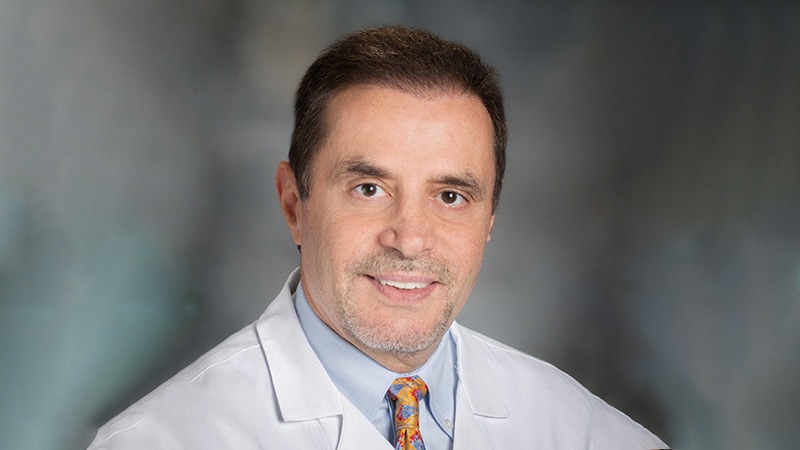Grunnleggende konsepter
Hagop Kantarjian honored for transformative leukemia research.
Sammendrag
Hagop Kantarjian, MD, receives the 2023 David A. Karnofsky Memorial Award from ASCO for his groundbreaking work in leukemia research. The award recognizes his significant contributions to improving treatment outcomes for various leukemia subtypes. Kantarjian's career achievements span over four decades and have led to the development of innovative therapies that have revolutionized the field of leukemia treatment. His dedication to impactful cancer research and patient care is evident through his extensive body of work and commitment to mentoring the next generation of oncologists.
Highlights:
- Kantarjian's research has dramatically improved survival rates in leukemia patients.
- He has developed several standard-of-care therapies for leukemia subtypes.
- Kantarjian's advocacy for affordable drug therapies highlights the importance of universal healthcare access.
- The award recognizes his lifelong commitment to impactful cancer research and patient care.
Tilpass sammendrag
Omskriv med AI
Generer sitater
Oversett kilde
Til et annet språk
Generer tankekart
fra kildeinnhold
Besøk kilde
www.medscape.com
Hagop Kantarjian, MD, Honored by ASCO for Leukemia Research
Statistikk
"Kantarjian has authored more than 2200 peer-reviewed articles and more than 100 book chapters."
"The David A. Karnofsky Memorial Award includes a $25,000 honorarium."
"Kantarjian hopes new legislation will eventually turn the tide on high cancer drug costs."
Sitater
"Four decades ago, most of the leukemias were incurable. Today, most of the leukemias are potentially curable with targeted therapies. That's what I am most proud of." - Hagop Kantarjian
"Drug costs have been increasing over time. If you think about it, even if you discover a drug that cures cancer, but the drug is affordable for the 1% of the patients, then you have no cure for cancer." - Hagop Kantarjian
Viktige innsikter hentet fra
by Megan Brooks klokken www.medscape.com 05-15-2023
https://www.medscape.com/viewarticle/991927
Dypere Spørsmål
How can the healthcare system address the issue of high drug costs while ensuring access to life-saving treatments?
Addressing the issue of high drug costs in the healthcare system requires a multi-faceted approach. One key strategy is to increase transparency in drug pricing, allowing patients and providers to understand the factors contributing to high costs. Negotiating drug prices with pharmaceutical companies and implementing price controls can also help make medications more affordable. Additionally, promoting the use of generic drugs and biosimilars can provide cost-effective alternatives to brand-name medications.
To ensure access to life-saving treatments, healthcare systems can explore value-based pricing models that tie the cost of drugs to their clinical benefits. This approach incentivizes the development of innovative therapies while ensuring that patients have access to effective treatments. Furthermore, expanding insurance coverage and implementing programs to assist low-income patients with medication costs can help improve access to essential medications.
How can the next generation of oncologists be inspired to continue the legacy of impactful cancer research and patient care?
Inspiring the next generation of oncologists to continue the legacy of impactful cancer research and patient care involves providing mentorship, educational opportunities, and resources to support their professional development. Oncology training programs should emphasize the importance of research and encourage young oncologists to pursue innovative projects that can advance the field.
Creating collaborative research environments where young oncologists can work alongside experienced researchers and clinicians can foster a passion for cancer research. Additionally, highlighting success stories of renowned oncologists like Hagop Kantarjian can serve as inspiration for aspiring oncologists to make a difference in the field.
Moreover, promoting a culture of continuous learning and professional growth within the oncology community can motivate the next generation to strive for excellence in patient care and research. By nurturing their passion for oncology and providing them with the necessary support, we can ensure that future oncologists continue to make significant contributions to cancer care.
What challenges might arise in implementing universal equitable healthcare, and how can they be overcome?
Implementing universal equitable healthcare faces several challenges, including political resistance, funding constraints, and disparities in healthcare infrastructure. Resistance from stakeholders who benefit from the current system can hinder efforts to establish universal healthcare. Overcoming this challenge requires effective advocacy, public education, and collaboration with policymakers to build support for equitable healthcare policies.
Funding universal healthcare can be a significant obstacle, as it requires substantial financial resources. Implementing innovative financing mechanisms, such as progressive taxation or public-private partnerships, can help ensure sustainable funding for universal healthcare. Additionally, addressing inefficiencies in the healthcare system and reducing administrative costs can free up resources to support equitable healthcare initiatives.
Disparities in healthcare infrastructure, including shortages of healthcare providers and unequal access to medical facilities, can also impede the implementation of universal healthcare. Investing in healthcare workforce development, expanding healthcare facilities in underserved areas, and leveraging telemedicine technologies can help bridge these gaps and ensure that all individuals have access to quality healthcare services. By addressing these challenges proactively and collaboratively, we can work towards achieving universal equitable healthcare for all.
0
